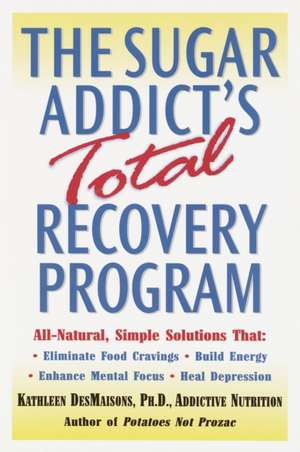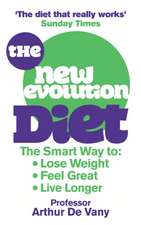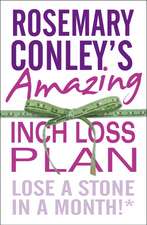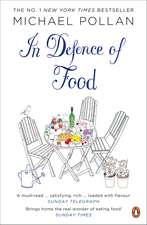The Sugar Addict's Total Recovery Program
Autor Kathleen Des Maisonsen Limba Engleză Paperback – 30 apr 2002
• How to integrate a “slow-carbs not low-carbs” strategy into your diet
• Why regular protein is essential and how to get it with every meal
• What to eat when a sugar craving strikes
• How to get the nutrition you need on the run–even at fast-food restaurants
• How to find an exercise program you’ll enjoy
• Ten breakfasts you can prepare in a flash
• Menus and recipes for every lifestyle and taste
Practical, hands-on, and reader friendly, The Sugar Addict’s Total Recovery Program will transform your life by helping you eat right–starting today!
Preț: 106.64 lei
Nou
Puncte Express: 160
Preț estimativ în valută:
20.41€ • 21.18$ • 17.06£
20.41€ • 21.18$ • 17.06£
Carte disponibilă
Livrare economică 24 februarie-10 martie
Preluare comenzi: 021 569.72.76
Specificații
ISBN-13: 9780345441331
ISBN-10: 0345441338
Pagini: 288
Dimensiuni: 138 x 210 x 17 mm
Greutate: 0.23 kg
Ediția:Trade Pbk.
Editura: BALLANTINE BOOKS
ISBN-10: 0345441338
Pagini: 288
Dimensiuni: 138 x 210 x 17 mm
Greutate: 0.23 kg
Ediția:Trade Pbk.
Editura: BALLANTINE BOOKS
Notă biografică
“A practical, compassionate, uplifting, and very effective way to recover from the ravages of sugar addiction and reclaim control of your health and your life. I highly recommend it.”
–CHRISTIANE NORTHRUP, M.D.
Author of Women’s Bodies, Women’s Wisdom
–CHRISTIANE NORTHRUP, M.D.
Author of Women’s Bodies, Women’s Wisdom
Extras
Why You Are Different
If you are a sugar addict, you can't "just say no" to ice cream, candy,
soda, chocolate, or cookies. If you are a sugar addict, people have been
saying "watch your calories," "exercise more," "clean up your room," "stop
snacking on cookies," "stop drinking," "stop smoking," or "why don't you
just ______" to you nearly all your life. You fill in the blank. The
message is the same, although the content may vary.
The problem is clear. You are doing something that you don't want to be
doing. But the solution isn't so clear. If you could just stop it, you
would! You can't just say no. And the longer this helplessness goes on,
the more tricks you try, the more failures you have and the more hopeless
you feel. On the outside you may act cool. You might even have flip
responses or pat retorts, but each time you hear the "why don't you just
say no" message-even if it is subtle-you brace yourself. You ask yourself:
"Why can't I get it together and take care of myself? Where is my
willpower? Why aren't I like other people?" They just decide to do
something and then they follow through. Again and again you decide, you
make a commitment, you start-then your resolve fades. You get busy, you
get overwhelmed, you get distracted, and your intention dissipates like
the morning fog in the noonday sun.
Nancy is a sugar addict. She has vowed to give up chocolate almost every
day of her life. Three days into her commitment to quit, something always
happens and she reaches for a candy bar. Rosemary, who is not a sugar
addict, decides that chocolate isn't good for her skin. She decides to cut
it out of her diet, never buys another candy bar, isn't tempted, and
doesn't think of it again. Rosemary's resolve may be inconceivable to you.
Nancy feels like your sister.
When you are a sugar addict, saying no is not an issue of willpower. Your
biochemistry has a direct effect on your behavior. Your craving and desire
for sugar are profoundly affected by your brain chemistry, and even more
significant, by what and when you eat.
You are a sugar addict because you are sugar sensitive. Sugar addiction is
a primary symptom of sugar sensitivity. If you are sugar sensitive and
your meals are erratic, if you skip breakfast, eat lots of sweet things,
drink quarts of diet soda or eat pounds of pasta and bread, then you will
be depressed, moody, erratic, volatile, forgetful, and impulsive. You may
have a short fuse, a short attention span, and a reputation for being all
over the place. You may have trouble with your weight, you may have an
eating disorder, or you may have a problem with aggression.
It has probably not occurred to you that the food you eat could have such
a dramatic effect on you. You may have figured out that sometimes you are
really cranky when you haven't had your "fix." You have to go out and get
a pint of your special brand of ice cream even if it's eleven o'clock at
night. Your friends or parents or boss may have noticed that you have
something like a split personality. Sometimes you are creative, cheerful,
charming, funny, and delightful. Other times you are a royal pain in the
butt and even the people who love you stay out of your way. You are a
sugar addict.
When you first hear me talking about sugar addiction in this way, you may
not be convinced that it is a real condition. You may not think it is
possible to be addicted to something so "harmless" as sugar. Stay with me
while I take you through the reasoning for my position.
Criteria for Addiction
Here are the criteria the American Psychiatric Association uses to
determine addiction:
¸ The substance is taken in greater amounts or for a longer time than
intended.
¸ There is a persistent desire or one or more unsuccessful attempts to cut
down or control use.
¸ Major time is spent in seeking, using, or recovering from the effects of
use.
¸ Frequent intoxication or withdrawal interferes with responsibilities.
¸ There is a decreased level of social, recreational activities due to use.
¸ There is continued use despite adverse consequences.
¸ There is a marked increase in tolerance.
¸ There are withdrawal symptoms.
¸ There is use to prevent withdrawal.
Let's reframe these criteria and see if we can create a list for sugar
addiction.
¸ The substance is taken in greater amounts or for a longer time than
intended.
Have you ever planned to have just a cookie and eaten the whole plate?
Have you ever planned to have a caramel double latte once as a celebration
and found yourself going back every day? Have you ever planned to have a
piece of pie and eaten the whole thing? Can you imagine eating half a
piece of cake and leaving the rest because you just weren't hungry for it?
¸ There is a persistent desire or one or more unsuccessful attempts to cut
down or control use.
One or more unsuccessful attempts seem sort of funny to sugar addicts.
Have you ever tried to control your use? Does that question make you laugh
because it seems so absurd? Have you spent most of your life since eighth
grade trying to cut down or control your use of sweet things? Once you
start eating sweet things, you cannot stop.
¸ Major time is spent in seeking, using, or recovering from the effects of
use.
Do you make sure you always have a can of Coke (or even Diet Coke) on your
desk? Do you make a special trip to Costco to get that big jar of jelly
beans? Do you feel an inordinate sense of relief when your family is gone
so you can eat what you want? Do you have sugar hangovers and feel cranky
and irritable the day after?
¸ Frequent intoxication or withdrawal interferes with responsibilities.
Now at first blush, you may think that your sugar use does not affect your
life. But are your bills paid on time? Is your desk cleared off? Do you
double-book appointments? Are you too tired to function at three in the
afternoon? Are you funny, charming, and all over the place when you eat
sugar or have your soda or sweetened coffee? Look at your behavior with a
different eye and you may be shocked at how true this is.
¸ There is a decreased level of social, recreational activities due to use.
Do you prefer to be alone so you can eat what you want, when? Do you get
nervous about visiting your son's apartment because you know he doesn't
have anything there for you to eat? Do you shy away from those friends who
have given up those sweet things? Are you drawn to the people doing the
"reward meal" on the Carbohydrate Addict's Diet because you know you will
have company in eating what you want?
¸ There is continued use despite adverse consequences.
This is the ringer-continued use despite adverse consequences. You know
it's bad for you, you know it's killing you, you are in despair, and you
go back for more. Hits kinda close to home, yes?
¸ There is a marked increase in tolerance.
You need more to get the same effect. One small cookie won't cut it. You
have to eat the whole box. You remember not so much the high feeling, but
the feeling of relief-that the world is okay, you fit, and things will be
all right. But it takes more to get you there.
¸ There are withdrawal symptoms.
You may not have made the connection to withdrawal per se. You may simply
intuitively know that you feel better if you have a cup of tea and a piece
of cake. Or you know exactly how much better you will feel once you get
your supply down the hatch.
¸ There is use to prevent withdrawal.
You know you are cranky and will feel better if you have something sweet.
Your three-year-old is having a temper tantrum because you said no to her
in the grocery story. You get a soda and pop it open and she sits there
being a good girl. You take a sugar break at 3:00 p.m. because you know if
you don't you will be a basket case by 3:30. You know what time the
edginess will start.
Sobering, isn't it? Makes you think. When you first connect with this idea
of sugar addiction, it may be a little scary to you. You may find it hard
to put yourself in the same class as alcoholics or heroin addicts. You may
have been conditioned to think that addiction is bad and only weak-willed
people are addicts or alcoholics. This book will help you understand that
addiction is a chemical reality. The reason you are a sugar addict is your
unique body. You respond to sugar more intensely. You hurt more in
withdrawal. You feel better when you have it. The physical dependence is
real. You are not a bad person; this is not a character defect. Once you
start to think of yourself as having a unique brain and body chemistry,
you can start on the road to recovery.
If you are a sugar addict, you can't "just say no" to ice cream, candy,
soda, chocolate, or cookies. If you are a sugar addict, people have been
saying "watch your calories," "exercise more," "clean up your room," "stop
snacking on cookies," "stop drinking," "stop smoking," or "why don't you
just ______" to you nearly all your life. You fill in the blank. The
message is the same, although the content may vary.
The problem is clear. You are doing something that you don't want to be
doing. But the solution isn't so clear. If you could just stop it, you
would! You can't just say no. And the longer this helplessness goes on,
the more tricks you try, the more failures you have and the more hopeless
you feel. On the outside you may act cool. You might even have flip
responses or pat retorts, but each time you hear the "why don't you just
say no" message-even if it is subtle-you brace yourself. You ask yourself:
"Why can't I get it together and take care of myself? Where is my
willpower? Why aren't I like other people?" They just decide to do
something and then they follow through. Again and again you decide, you
make a commitment, you start-then your resolve fades. You get busy, you
get overwhelmed, you get distracted, and your intention dissipates like
the morning fog in the noonday sun.
Nancy is a sugar addict. She has vowed to give up chocolate almost every
day of her life. Three days into her commitment to quit, something always
happens and she reaches for a candy bar. Rosemary, who is not a sugar
addict, decides that chocolate isn't good for her skin. She decides to cut
it out of her diet, never buys another candy bar, isn't tempted, and
doesn't think of it again. Rosemary's resolve may be inconceivable to you.
Nancy feels like your sister.
When you are a sugar addict, saying no is not an issue of willpower. Your
biochemistry has a direct effect on your behavior. Your craving and desire
for sugar are profoundly affected by your brain chemistry, and even more
significant, by what and when you eat.
You are a sugar addict because you are sugar sensitive. Sugar addiction is
a primary symptom of sugar sensitivity. If you are sugar sensitive and
your meals are erratic, if you skip breakfast, eat lots of sweet things,
drink quarts of diet soda or eat pounds of pasta and bread, then you will
be depressed, moody, erratic, volatile, forgetful, and impulsive. You may
have a short fuse, a short attention span, and a reputation for being all
over the place. You may have trouble with your weight, you may have an
eating disorder, or you may have a problem with aggression.
It has probably not occurred to you that the food you eat could have such
a dramatic effect on you. You may have figured out that sometimes you are
really cranky when you haven't had your "fix." You have to go out and get
a pint of your special brand of ice cream even if it's eleven o'clock at
night. Your friends or parents or boss may have noticed that you have
something like a split personality. Sometimes you are creative, cheerful,
charming, funny, and delightful. Other times you are a royal pain in the
butt and even the people who love you stay out of your way. You are a
sugar addict.
When you first hear me talking about sugar addiction in this way, you may
not be convinced that it is a real condition. You may not think it is
possible to be addicted to something so "harmless" as sugar. Stay with me
while I take you through the reasoning for my position.
Criteria for Addiction
Here are the criteria the American Psychiatric Association uses to
determine addiction:
¸ The substance is taken in greater amounts or for a longer time than
intended.
¸ There is a persistent desire or one or more unsuccessful attempts to cut
down or control use.
¸ Major time is spent in seeking, using, or recovering from the effects of
use.
¸ Frequent intoxication or withdrawal interferes with responsibilities.
¸ There is a decreased level of social, recreational activities due to use.
¸ There is continued use despite adverse consequences.
¸ There is a marked increase in tolerance.
¸ There are withdrawal symptoms.
¸ There is use to prevent withdrawal.
Let's reframe these criteria and see if we can create a list for sugar
addiction.
¸ The substance is taken in greater amounts or for a longer time than
intended.
Have you ever planned to have just a cookie and eaten the whole plate?
Have you ever planned to have a caramel double latte once as a celebration
and found yourself going back every day? Have you ever planned to have a
piece of pie and eaten the whole thing? Can you imagine eating half a
piece of cake and leaving the rest because you just weren't hungry for it?
¸ There is a persistent desire or one or more unsuccessful attempts to cut
down or control use.
One or more unsuccessful attempts seem sort of funny to sugar addicts.
Have you ever tried to control your use? Does that question make you laugh
because it seems so absurd? Have you spent most of your life since eighth
grade trying to cut down or control your use of sweet things? Once you
start eating sweet things, you cannot stop.
¸ Major time is spent in seeking, using, or recovering from the effects of
use.
Do you make sure you always have a can of Coke (or even Diet Coke) on your
desk? Do you make a special trip to Costco to get that big jar of jelly
beans? Do you feel an inordinate sense of relief when your family is gone
so you can eat what you want? Do you have sugar hangovers and feel cranky
and irritable the day after?
¸ Frequent intoxication or withdrawal interferes with responsibilities.
Now at first blush, you may think that your sugar use does not affect your
life. But are your bills paid on time? Is your desk cleared off? Do you
double-book appointments? Are you too tired to function at three in the
afternoon? Are you funny, charming, and all over the place when you eat
sugar or have your soda or sweetened coffee? Look at your behavior with a
different eye and you may be shocked at how true this is.
¸ There is a decreased level of social, recreational activities due to use.
Do you prefer to be alone so you can eat what you want, when? Do you get
nervous about visiting your son's apartment because you know he doesn't
have anything there for you to eat? Do you shy away from those friends who
have given up those sweet things? Are you drawn to the people doing the
"reward meal" on the Carbohydrate Addict's Diet because you know you will
have company in eating what you want?
¸ There is continued use despite adverse consequences.
This is the ringer-continued use despite adverse consequences. You know
it's bad for you, you know it's killing you, you are in despair, and you
go back for more. Hits kinda close to home, yes?
¸ There is a marked increase in tolerance.
You need more to get the same effect. One small cookie won't cut it. You
have to eat the whole box. You remember not so much the high feeling, but
the feeling of relief-that the world is okay, you fit, and things will be
all right. But it takes more to get you there.
¸ There are withdrawal symptoms.
You may not have made the connection to withdrawal per se. You may simply
intuitively know that you feel better if you have a cup of tea and a piece
of cake. Or you know exactly how much better you will feel once you get
your supply down the hatch.
¸ There is use to prevent withdrawal.
You know you are cranky and will feel better if you have something sweet.
Your three-year-old is having a temper tantrum because you said no to her
in the grocery story. You get a soda and pop it open and she sits there
being a good girl. You take a sugar break at 3:00 p.m. because you know if
you don't you will be a basket case by 3:30. You know what time the
edginess will start.
Sobering, isn't it? Makes you think. When you first connect with this idea
of sugar addiction, it may be a little scary to you. You may find it hard
to put yourself in the same class as alcoholics or heroin addicts. You may
have been conditioned to think that addiction is bad and only weak-willed
people are addicts or alcoholics. This book will help you understand that
addiction is a chemical reality. The reason you are a sugar addict is your
unique body. You respond to sugar more intensely. You hurt more in
withdrawal. You feel better when you have it. The physical dependence is
real. You are not a bad person; this is not a character defect. Once you
start to think of yourself as having a unique brain and body chemistry,
you can start on the road to recovery.
Descriere
From the author of the nationally bestselling "Potatoes Not Prozac" comes a complete, in-depth dietary plan for day-to-day living with--and overcoming--sugar sensitivity.






